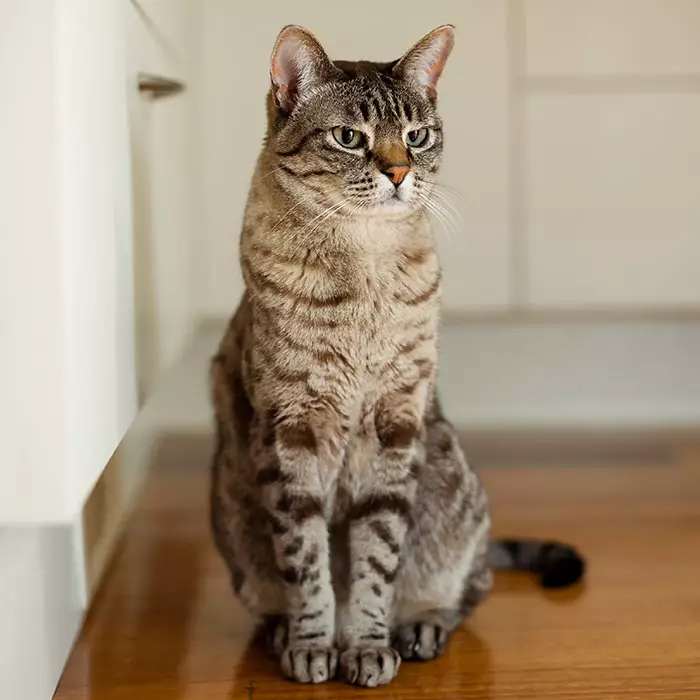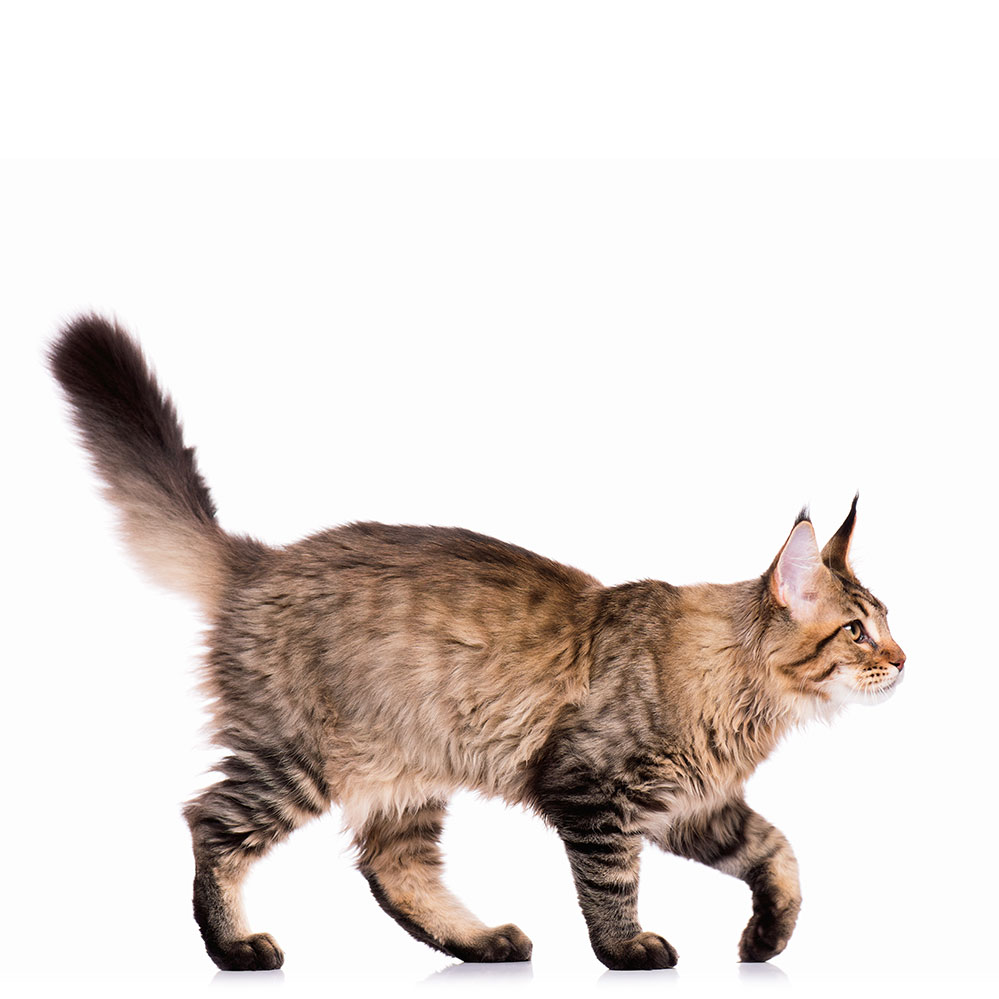Understanding feline behaviour: Why does my cat sleep on me?
There are many weird and wonderful questions for cat owners to ponder, for example, Why does my cat bite me out of nowhere? Why does my cat follow me everywhere? Why does my cat sleep on me?
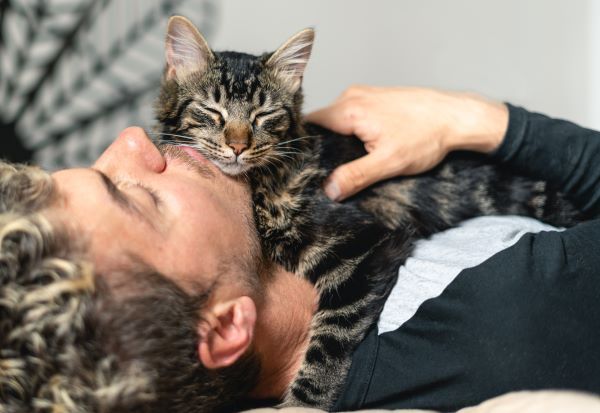
Cat behaviour can be fascinating to observe and frustrating to figure out. Whether your cat likes to curl up on your lap for a nap while you watch TV, or lie right on top of you when you are trying to sleep, there are a number of possible explanations for this heartwarming – although sometimes unwelcome – feline behaviour.
When your kitty treats you like its favourite and coziest sleeping spot, it may be time to try to figure out why, and what you can do about it.
The reasons why cats sleep on their owners
Comfort and warmth
 Cats like warmth, and they like nothing more than a warm, cosy spot to sleep in. Up against the heater, in a pile of laundry, on top of you… when it comes to cats’ preferred sleeping places, warmth definitely overrides comfort, particularly in winter.
Cats like warmth, and they like nothing more than a warm, cosy spot to sleep in. Up against the heater, in a pile of laundry, on top of you… when it comes to cats’ preferred sleeping places, warmth definitely overrides comfort, particularly in winter.
And if you are wondering why does my cat sleep on me, rather than in their own cozy bed?, it may be because your body emits heat and your unique scent, both of which are appealing to your cat.
Additionally, if your cat lies on or near your chest they can hear your heartbeat, which is calming and comforting for them. They can also hear and feel your breathing, which they may find soothing.
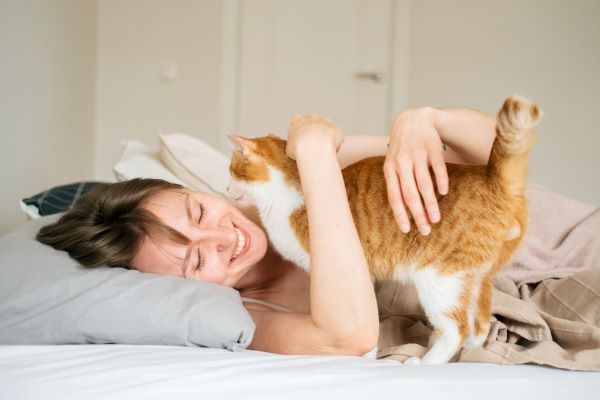
Security and safety
As cats in the wild are not only predators but also prey, they are always looking out for potential threats. Sleeptime is a vulnerable time for them.
For domestic cats, sleeping as close to you as possible allows them to feel more relaxed, knowing that you, their human protector, will watch over them.
Cats like to sleep in an elevated position where they are less at risk of being disturbed or harmed, which is why cats in the wild like to sleep in trees. Lying on top of you places your cat at the highest – and safest – position on the bed.
Bonding and affection
Cats sleep with their owners because they have an emotional connection with them. Sleeping on you is a sign of the strong bond between you.
Think of it as your cat’s way of saying “I love you, I want to be near you and spend time with you.”
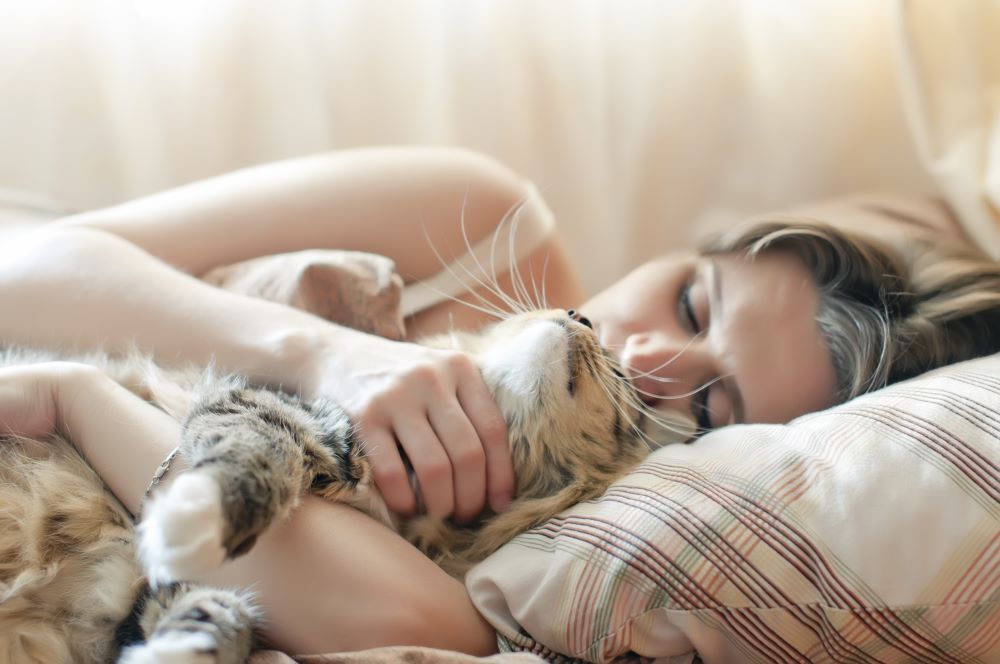
Understanding feline behaviour
Instinctual and learned behaviours
Cats have some very strong instincts that have carried through from their wild ancestors, and some of these may help us understand why our domesticated felines behave in certain ways.
There are also certain learned behaviours that they pick up from their mother and siblings while very young that stay with them throughout their lives.
When it comes to their sleeping habits:
- Cats seek the safest place to rest or sleep between hunts. In your home, if you share a close bond, that may be as close as possible to you.
- They like to be hidden or elevated in trees in case a predator shows up. In your home, they like burrowing into blankets and hiding away in small, elevated spaces.
- For the first 12 weeks of life they sleep piled up with their littermates (known as pillowing). In your home, you are their surrogate pillow.
- Cats are territorial animals that mark their turf with their scent. They release pheromones from their face and body, and sleeping on you allows them to spread their scent over you, thereby marking you as theirs.
Communication through body language
Cats are complex creatures, and cat owners may sometimes overlook their cat’s attempts to communicate or misunderstand the message they are trying to convey.
There are many non-verbal ways our cats use to communicate with us, such as by licking us, swishing their tails and even clawing us. Our job as pet parents is to watch carefully and try to read their signs and decode their messages, so that we can respond appropriately.
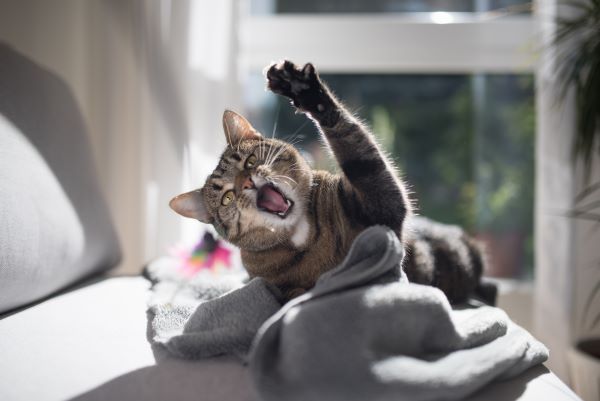
Is your cat sleeping on you as a way to try to tell you something? “I love you”, “I’m feeling insecure”, or “I’m here to protect you”, perhaps.
Or, if you’ve not been paying them enough attention, they might be trying to get some from you, and have learned that lying on top of you is a guaranteed method of achieving this.
Learn more about cat body language here.
Should you encourage or discourage your cat from sleeping on you?
There’s no right or wrong answer here. It’s your personal choice whether to allow your cat to sleep on you or not.
If you’re happy to encourage it, the advantages are that your cat will feel warm, safe and loved. If you spend most of the day away from home, your cat sleeping on you is a great way for you to bond and spend time together. Petting your cat while they sleep on you is also a way for you to destress, as it releases oxytocin in humans as well as cats.
However, if your cat’s sleeping habits are disturbing your sleep or affecting your relationship with your partner, you’re probably better off discouraging her from using you as a mattress.
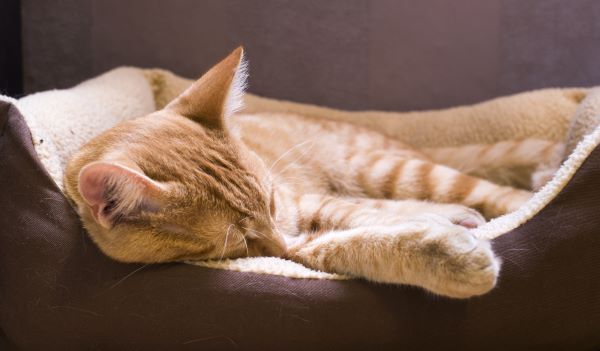
Pros and cons of letting your cat sleep on you
Pros |
Cons |
| Stress relief – increased oxytocin, decreased cortisol from petting | Disturbed sleep – especially for light sleepers |
| Bonding – lots of time to catch up on snuggles | Discomfort – even a small cat can start to feel very heavy after a while |
| Warmth – a built-in hot water bottle that stays hot! | Hygiene issues – kitty litter and furballs in your bed! |
Tips to discourage your cat from sleeping on you
If the cons outweight the pros, you may want to implement some changes. Here are some suggestions how you can discourage your cat from sleeping on you:
Provide cozy sleeping spots
- Make sure there are lots of blankets for kitty to burrow into. The bed itself is not as important – a cardboard box or other cave-like space can become a very inviting sleeping spot with the right bedding.
- Have you bought an expensive bed that your cat just isn’t keen on? Try moving it to a quiet corner or a warmer position away from any draughts.
- Cats feel most secure when they are somewhere high up where they have a ‘bird’s eye view’. Try placing some cosy bedding on an elevated perch, secure shelf or wide windowsill, and see if kitty takes to it with more enthusiasm.
- A heated pet bed can be a game changer if your kitty is using you for warmth.
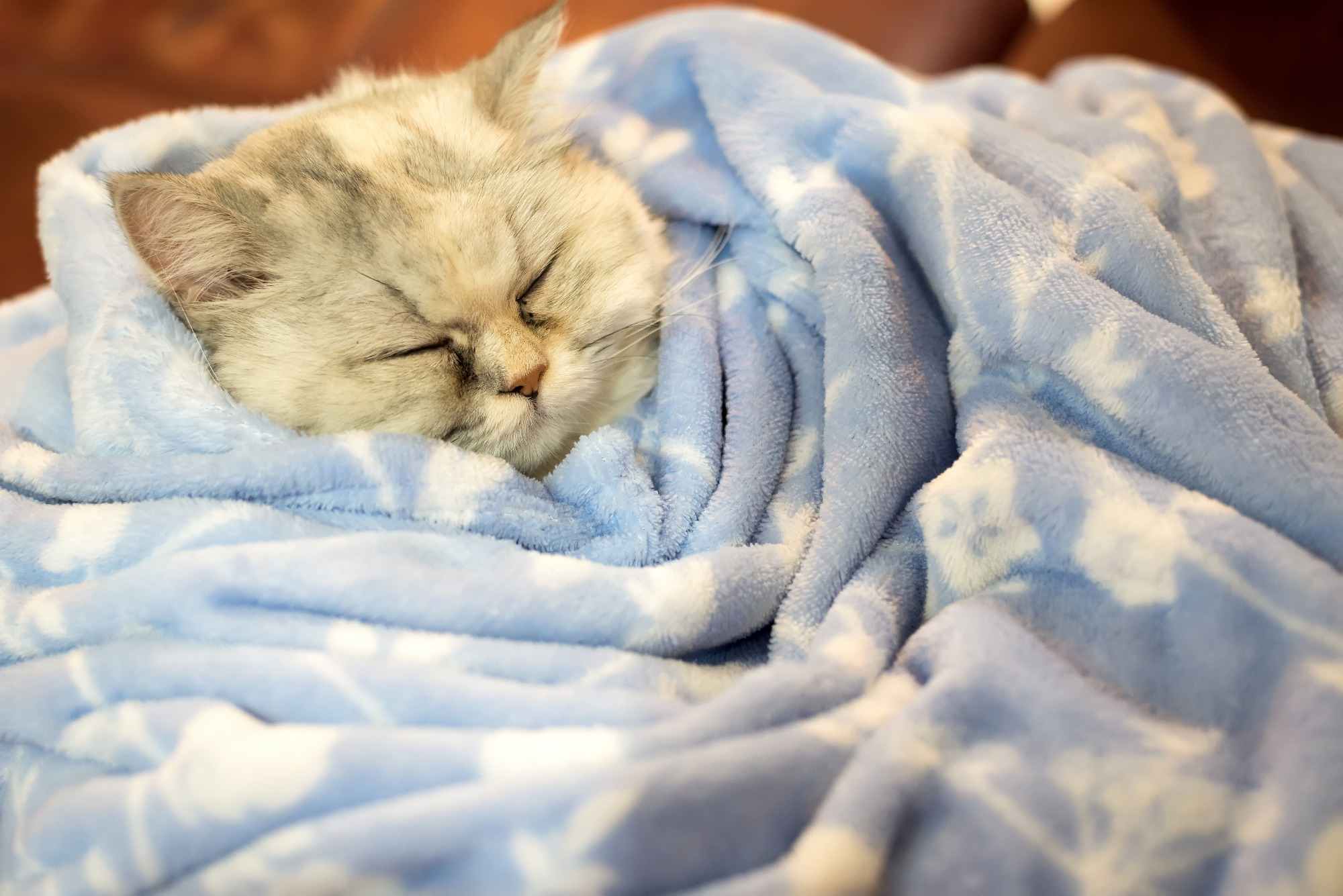
Use positive reinforcement
It’s important not to respond to your kitty’s sleeping on you or waking you up with punishment. Cats don’t generally take well to punishment; in fact, negative feedback is more likely to exacerbate the problem. But definitely don’t reward the unwanted behaviour either, or your cat will most likely repeat it.
With this in mind, positive reinforcement in response to good behaviour is the way to go. Praise her when she is lying next to you, or in another spot, rather than on you.
Set boundaries and redirect unwanted behaviour
 If your cat’s sleeping on you is becoming a problem, you may need to ban her from the bedroom altogether. Cats appreciate personal boundaries and having their own space, so don’t feel bad about having her sleep in another room.
If your cat’s sleeping on you is becoming a problem, you may need to ban her from the bedroom altogether. Cats appreciate personal boundaries and having their own space, so don’t feel bad about having her sleep in another room.
If this seems too harsh, you could sleep with the bedroom door slightly open so that she can get out without waking you. To encourage this, leave a few noiseless toys outside the bedroom or place a bird feeder outside a window that she can sit next to, to provide early morning viewing entertainment.
Strengthen the bond with your cat
Spending quality time together during the day or evening can help your cat feel less needy or clingy when it comes to bed time.
Interactive play will provide mental and physical stimulation for your cat and keep her active, alert and entertained. Playing with you, her special human, will strengthen the bond between the two of you and facilitate communication between you.
Engaging and stimulating interactive toys that you can enjoy together include:
- Laser pointers
- Fishing poles
- Pheasant feathers
- Bubble wands
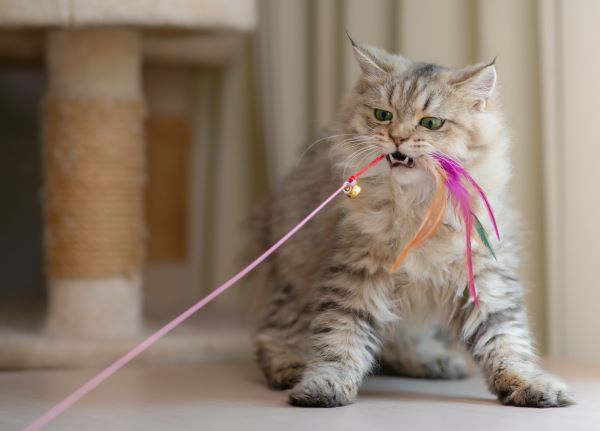
See our article Cat play and toys – it’s not just fun & games!
Seek professional advice if necessary
If you’re unable to change your cat’s sleeping habits, and this has become a problem for you, it is probably best to consult your vet or an animal behavourist for advice.
FAQs
Why does my cat knead me before settling down to sleep?
Kneading refers to the instinctive feline behaviour of repetitively massaging into a soft surface with their paws, as if they are kneading dough.
Often, cats will knead, whether it’s your lap or a blanket, before settling down for a nap, as a way to make it a comfortable place to rest. Kneading also appears to release a flow a relaxing hormones that calm and soothe the cat.
Is it normal for my cat to sleep on my face?
Many cats do this, to the annoyance of their pet parents. Your head may be the only part of you sticking out from the covers, making it easily accessible.
Also, your head releases heat and stays more still through the night than the rest of your body, making it an attractive choice of bed for your kitty.
Or it could be ‘pillowing’ behaviour, which is the term used to describe what kittens do when they sleep on each other, effectively using their litter mates as pillows.
What should I do if my cat’s nighttime behaviours disrupt my sleep?
You can do things to make another spot more appealing, such as making it cozy and warm, putting it higher up so they feel safe and secluded, and leading them there with treats.
Conclusion
For a number of reasons, some cats like to sleep on their owner’s chest, legs or even on their face. If you’re happy with this sleeping arrangement, the benefit is that it will enhance your relationship with your cat and strengthen the bond between you.
If your cat’s sleeping on you is disturbing your sleep, gently encouraging her to sleep elsewhere will make for more harmonious, and less uncomfortable, interactions between the two of you in the long term.
Bow Wow Meow Pet Insurance can help protect you and your cat should an unexpected trip to the vet occur.
-
Find out more about our cat insurance options
-
Get an online pet insurance quote






